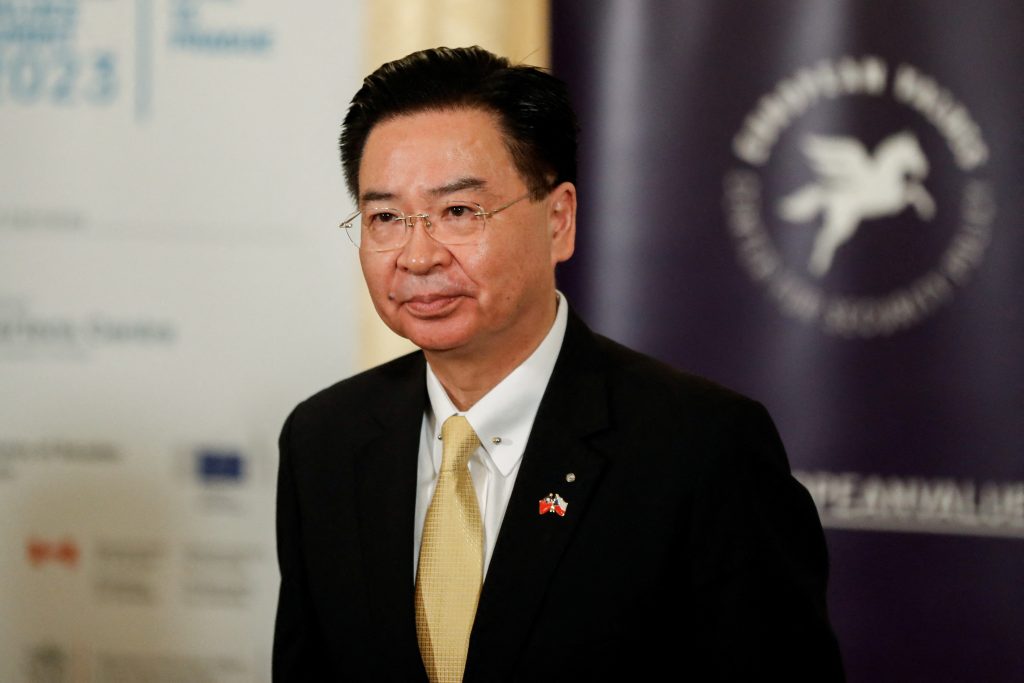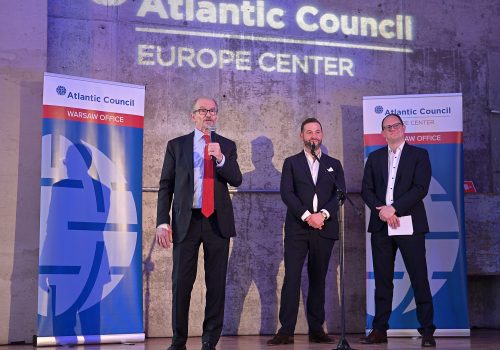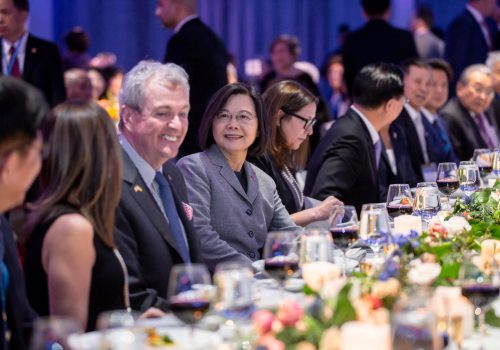In recent months, a number of Western European leaders and officials have trekked east. German Chancellor Olaf Scholz visited Beijing last November, followed by German Foreign Minister Annalena Baerbock in April. French President Emmanuel Macron also went to China in April, along with European Commission President Ursula von der Leyen. Spanish Prime Minister Pedro Sánchez traveled there earlier, in March. But there was another notable yet underreported visit in the opposite direction. This month, Taiwanese Foreign Minister Joseph Wu traveled west to visit Poland, Czechia, Italy, and Brussels. He held numerous meetings, including with lawmakers. In Prague, he spoke with the speakers of both chambers of the parliament and appeared right after Czech President Petr Pavel at the podium of a conference organized by the European Values Center for Security Policy, which is so far the only European Union (EU)-based think tank with an office in Taiwan.
Wu’s visit demonstrates a developing trend. In recent years, Central and Eastern European (CEE) countries have established themselves as some of the closest friends of Taiwan. A handful of CEE capitals are now working to raise the Taiwan question higher on the EU agenda amid the bloc’s ongoing search for new relations with China, even as much of Western Europe exhibits more caution in reshaping its geopolitical and economic relations with Beijing.
CEE countries’ approach to Taiwan is in large part a function of their China policies. Taiwan has come to the forefront of their attention mainly because of frustration with Beijing. There are several reasons for this development. First, former Soviet satellites can, given their history, be more sensitive to the threats stemming from authoritarian regimes. With Beijing apparently trying to help Russian President Vladimir Putin’s war against Ukraine, CEE leaders and officials have drawn a parallel there. China is becoming a new Russia, a revisionist power endangering the liberal-democratic world order. Second, CEE countries see how Beijing dealt with the COVID-19 pandemic and how its irresponsible behavior contributed to a major global crisis. Third, Washington’s sharper approach toward Beijing, which the Trump administration rolled out and the Biden administration has doubled down on, has enabled, or at least facilitated, the shift in approach among some CEE countries. Fourth, some CEE leaders are frustrated by unfulfilled Chinese investment promises in the region.
Lithuania should be a wake-up call
As a result of all these factors, China’s “17+1” platform, formed in 2012 to gain further influence in CEE, started to crumble. The first country to drop out was Lithuania in 2021, followed in 2022 by Estonia and Latvia.
In 2021, Lithuania allowed the opening of a Taiwanese representative office in Vilnius. This angered China, as it made Lithuania the first EU member state to use the name of Taiwan instead of Taipei for its economic and cultural office. Beijing said it was a breach of its “one China principle” and responded by downgrading diplomatic relations with Lithuania, recalling its ambassador from Vilnius, and ordering the country’s envoy to leave China. Beijing also launched harsh economic sanctions, blocking most of its trade with Lithuania and later also pressuring companies in other EU countries to stop doing business with the Baltic state.
Fortunately, Lithuania’s trade with China was limited, and other European countries and the United States came to Lithuania’s aid with trade support. EU and transatlantic unity proved to be the core of the successful defense against Chinese coercion. Nonetheless, Beijing’s actions should serve as a wake-up call for countries that have extensive business with China. It will be more difficult for allies of larger countries with deeper ties to China’s economy to make a difference with their help compared to what they have easily done in the case of small Lithuania.
How Czechia has engaged with Taiwan
Still, friendlier relations with Taiwan do not necessarily need to mean that ties with China will collapse completely, as illustrated by the case of Czechia and explained to me by Ivana Karásková from the Prague-based Association for International Affairs. Despite considerable changes in Czech rhetoric, major tensions have so far been avoided. This is where it differs from Václav Havel’s essentially idealistic approach in the 1990s, when the defense of Tibet and Taiwan was accompanied by the significant downgrade of bilateral relations with China.
A decade after Havel left Prague Castle in 2003, the foreign policy pendulum in Prague swung to the other side, focusing on business at the expense of human rights concerns. These were the times of social democratic governments and President Miloš Zeman, who once said in Beijing that he was eager to learn “how to increase economic growth and stabilize the society.” To be fair, the restart of relations with China had been launched already, during the government of Petr Nečas, as some in his Civic Democratic party—which now leads the country—were quite critical of what was called “Havel’s Dalai Lamaism.”
At that time, Taiwan became one of the ways for the opposition in Prague to push against Zeman and the government’s open-door China policy. In 2020, Czech Senate Speaker Miloš Vystrčil, the second highest-ranking official in the country, visited Taiwan and met with President Tsai Ing-wen. It was a landmark trip with only a few recent precedents.
Today, with the center-right government of Prime Minister Petr Fiala and especially Pavel, Prague has re-established Czechia as one of Taiwan’s best friends within the EU. It is moving back toward Havel’s legacy on the issue while at the same time trying to keep a solid working relationship with Beijing. However, there are two questions here: How long will China be on board, and is there a strong enough common agenda Beijing and Prague can work on together?
Meanwhile, Prague-Taipei relations are advancing. In March, Lower House Speaker Markéta Pekarová Adamová visited Taiwan, where she was accompanied by 150 business leaders, scientists, and officials, including directors of national counterintelligence and cybersecurity agencies. She met with Tsai and Prime Minister Chen Chien-jen. Several cooperation agreements were signed and there was even speculation about the possibility of Czechia selling arms to Taiwan, but that proved not to be accurate. There’s already ongoing military cooperation in the field of education, as indicated by a memorandum of understanding signed between Czech and Taiwanese defense universities.
Pavel made news for speaking over the phone with Tsai, who called him in January to congratulate him for his election victory. Pavel became the first European head of state to speak with the Taiwanese president. And as mentioned above, he accepted the invitation to speak on June 15 at an event in Prague just before Taiwan’s foreign minister, an unprecedented step for an EU head of state.
Officials I talk with in Prague say the Czech approach toward China and Taiwan has not changed in substance. The country has long had a “one China” policy that offers enough space for some strategic ambiguity on Taiwan. Instead, it’s about different accents, with now more emphasis on values and less of a singular focus on business. Prague is currently finalizing its very first national security strategy, expected any day now, which will be important to watch for how far it goes in calling China a security threat.
A likely path forward
Other CEE countries are moving in the same direction as well. Slovakia is steadily strengthening its ties with the island, having signed an agreement on semiconductor cooperation signed earlier this month. Poland, too, is now becoming more critical on China and more friendly toward Taiwan, despite Polish President Andrzej Duda’s long-term push for open arms toward Beijing. During his speech at an Atlantic Council event in April, Polish Prime Minister Mateusz Morawiecki warned Europeans about the dangers of deepening economic ties with China. He also drew a parallel between Ukraine and Taiwan: “You need to support Ukraine if you want Taiwan to stay as it is. If Ukraine gets conquered, the next day, China can attack Taiwan.” And as recently as June 19, Tsai received a Polish parliamentary delegation in Taipei.
Nevertheless, the tide is slow. Recent research from the European Council on Foreign Relations showed that European public opinion on China shifted surprisingly little during the past few years. A majority still perceive China as a partner that the EU should work with and don’t appear to buy into a democracy-versus-autocracy narrative. One shouldn’t expect any short- or medium-term diplomatic breakthroughs regarding Taiwan. Instead, greater development of economic and cultural cooperation, accompanied by the intensification of high-level diplomatic contacts, is the likely path forward. Bolder moves may come first from states less economically dependent on China, be they in CEE or in Western Europe.
Petr Tůma is a visiting fellow at the Atlantic Council’s Europe Center. He is a Czech career diplomat with an expertise on Europe, Middle East, and transatlantic relations. He previously worked at the Czech Embassy in Washington, DC.
Further reading
Thu, Jun 1, 2023
How the United States and Poland can use this moment to reshape transatlantic security
New Atlanticist By Daniel Fried
Poland and the United States must keep Ukraine front and center, maintain transatlantic unity, and champion democratic values. Our Warsaw Week charted a way forward.
Wed, Jun 21, 2023
Sanctioning China in a Taiwan crisis: Scenarios and risks
Report By
New research on possible options and their costs of G7 sanctions on China in the event of a Taiwan Crisis.
Mon, Apr 3, 2023
Don’t let Beijing define the narrative of Taiwan’s relations with the world
New Atlanticist By Markus Garlauskas
As Taiwan President Tsai Ing-wen stops in the United States, Beijing is trying to paint reasonable, routine, and restrained actions as risky, worrisome, and escalatory.
Image: Taiwan's Foreign Minister Joseph Wu delivers a speech during the European Values Summit in Prague, Czech Republic June 14, 2023.



